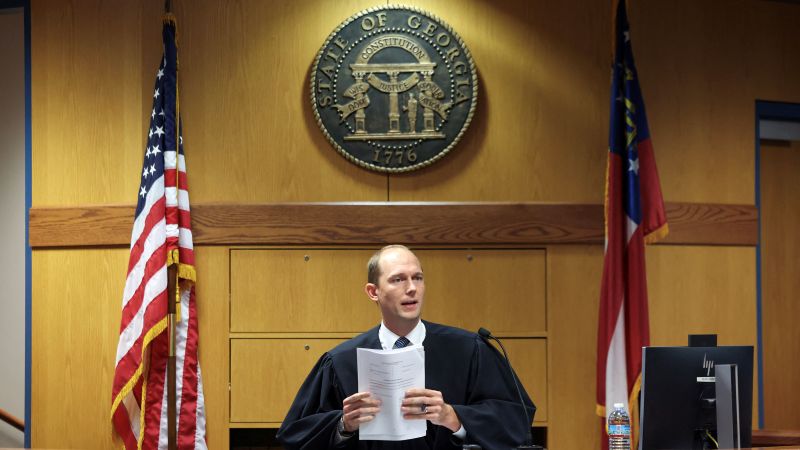CNN
—
The shape of the sprawling Fulton County, Georgia, trial against former President Donald Trump and 18 co-defendants began to emerge Wednesday at the first televised hearing in the case since the indictment was filed last month.
The Fulton County district attorney’s office said it’s planned a four months-long trial with more than 150 witnesses, while defense attorneys for two of the defendants, pro-Trump lawyers Kenneth Chesebro and Sidney Powell, argued their cases should be severed from the other defendants.
The state judge presiding over Trump’s election subversion case, Scott McAfee, denied the motion for Chesebro and Powell – who have both filed to hold a speedy trial – to sever their cases from each other, but he was skeptical of the district attorney’s desire to hold a trial for all 19 defendants beginning next month.
McAfee said he hopes to decide key questions on the trial schedule and breaking up the 19-defendant case by early next week.
Here are takeaways from Wednesday’s hearing:
Judge skeptical of a quick and joint trial
McAfee expressed skepticism about Fulton County District Attorney Fani Willis’ desire to hold a joint trial for all 19 defendants in October.
The judge has already set a trial date for Chesebro on October 23 after he made a speedy trial request under Georgia law, and Willis responded with a motion that all 19 defendants should be tried at the same time.
McAfee didn’t deny that motion – but he was dubious during Wednesday’s hearing.
“It just seems a bit unrealistic that we can handle all 19 (defendants) in 40-something days,” McAfee said.
Prosecutor Nathan Wade threw out some big numbers at Wednesday’s hearing: The Fulton County district attorney’s office expects its case against the 19 defendants would take about four months – and prosecutors expect to call more than 150 witnesses.
What’s more, prosecutors said that the case would be the same whether it is against one defendant or all 19 – as they argued against severing defendants into separate trials.
McAfee, however, thought the timeline was very optimistic, saying “it could easily be twice that,” given the multiple defendants in the case.
While McAfee suggested he would separate Powell and Chesebro from the other 17 defendants, he ruled from the bench Wednesday denying their motions to sever their cases from one another.
McAfee ruled that Powell and Chesebro will go to trial together on October 23.
“Based on what’s been presented today, I am not finding the severance for Mr. Cheseboro or Powell is necessary to achieve a fair determination of the guilt or innocence for either defendant in this case,” McAfee said.
He also said that two lengthy trials would clog up the court calendar and “inconvenience” jurors.
The attorneys for Chesebro and Powell each took the same strategy during Wednesday’s hearing: distancing their client from the other co-defendants.
Manny Arora, who represents Chesebro, argued that his client was not involved in most of the conspiracy alleged by Fulton County prosecutors, framing Chesebro as a more rational actor than other co-defendants, specifically Powell.
In 2020, Chesebro worked on the Trump campaign’s efforts to undermine the election results.
“Essentially – from what I understand from the public record – she was fired before this conspiracy actually even started up because she said something that was supposedly crazy and Trump people got rid of her,” Arora said of Powell.
Arora noted that Chesebro had never met Powell and had never been to Coffee County, Georgia, where a breach of voting systems is part of the allegations in the indictment against Powell.
When Powell’s attorney, Brian Rafferty, spoke, he made the same point, saying Powell didn’t know Chesebro and had no involvement in the fake elector allegations against Chesebro.
Rafferty argued that Powell was “not the driving force” behind the breach of voting machines in Coffee County, despite evidence put forward by prosecutors in support of allegations she helped coordinate and fund the effort.
But he claimed that his arguments would be “washed away in days and weeks of testimony about the Constitution” and the fake elector scheme.
Prosecutor Will Wooten argued that because the district attorney’s office charged a racketeering case under Georgia’s RICO – racketeer influenced and corrupt organizations – law, all of the evidence against each of the defendants is connected.
“All of the evidence is admissible against all of the defendants,” Wooten said.
“Anytime a person enters into a conspiracy, they are liable for all of the acts of all of their co-conspirators,” he added. “Evidence against one is evidence against all.”
This story is breaking and will be updated.


